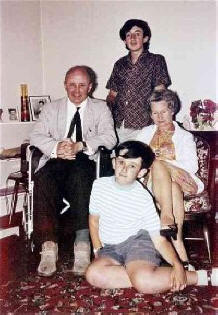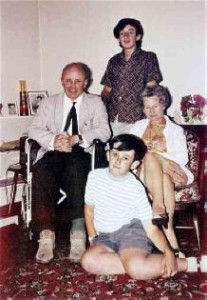By Jeremy Reynalds, Ph.D. Founder and CEO Joy Junction Inc.
With Mother’s Day on our minds, our thoughts obviously focus on “mom.” For this year’s celebration, let’s make sure that we do more than just buy mom a rose or two, take her out to dinner and go back to the way we’ve acted all year. Let’s make a resolution to start appreciating mom EVERY day of the year while we still have her.
Here’s my mother’s day story. While I wrote it in 2000 I believe that it is still just as relevant this year as it was back then.
The man made his way slowly up the stairs to the second floor of the hospital where his mother was a patient in the geriatric unit. He walked through the ward, passing by a variety of elderly people in various states of apparent mental difficulties and physical decay.
While he had been warned that his mother’s health was rapidly deteriorating it was still a shock to him when he saw her. She was sleeping but her breathing was heavy and labored. Her hands, lying pathetically at each side of her frail body, were badly swollen. Her once immaculately permed hair fell untidily in all the wrong places.
Being assured by a nurse that it would be okay to wake up his mother, the man went over to his mom and gently placed his hand on her shoulder. “Mom, it’s me,” he said. “Can you wake up?”
The woman stirred, blinked, opened her eyes fully and although a little confused appeared to be pleased to see her visitor.
“How are you?” the man asked.
“Not so good,” she said in a raspy, wheezing voice, speaking with difficulty. “I ask them to come and they don’t. I’ve got bad phlegm. Can you get me some tissues?”
The man took the nurse aside and asked her what exactly was wrong with his mother. She told the man that despite running all sorts of tests they didn’t exactly know. However, none of the tests explained the physical problems being faced by the man’s mother. The nurse pointed out that the man’s mother did have a drug patch attached to her back to help alleviate some of the pain she was experiencing.
After saying goodbye, the man left and came back the next day. His mother was sleeping. This time, things were worse than yesterday. When the man’s mother was woken up, her face was permeated with a blank, vacant stare. She was even unable to recall who had visited her that morning.
Then with the man standing directly in front of her, she said how nice it would be if her so n would come to see her. The man sighed inwardly and went to see the nurse, who again reiterated that while they didn’t know exactly what was wrong with his mother they were still doing all they could to help her. However, his mother apparently didn’t think so. With that vacant gaze she still kept telling her son, (apparently referring to the medical personnel) “I keep calling but they never come.”
A tragic story, but one especially gut wrenching for me – because the elderly woman was my mother. I visited her in late February 2000 as she lay in a hospital bed in South England: a “guest” of the country’s nationalized health service.
A couple of days later I was back in the United States, so glad that a couple of friends had all told me that I should do whatever it took to pay a visit to my “mum” while I could. The week after my return, life went on as usual — except that as you might imagine my mother was never that far from my thoughts.
The following weekend arrived and with it plans for a birthday party for one of my sons, combined with a high school graduation celebration for another and a birthday party for my granddaughter. While it was a happy occasion the joy was tempered by a phone call I received the day of the party.
My mother’s hospital had called saying that she was getting steadily worse and it was not anticipated that she would live through the day. When I asked exactly what was wrong they still didn’t know. In fact, the response I received was very vague and non-committal.
However, being on the other side of the ocean, and being unable to visit physically, what else could we do except pray and commit the situation to the Lord? So that’s exactly what we did. We then began getting the house ready for the party. Mid-way through the gathering, the phone rang. It was a nurse from the hospital in the United Kingdom, saying she was sad to have to tell me that “mum” had passed away a couple of hours before.
As you can imagine, I was very glad that the Lord had prompted me to go see her before she passed on. (The Lord had also been gracious enough to provide the funds for the airfare as well). However, I was especially thrilled that some months before this, when “Mum” first became ill, that I had contacted the pastor from my old church in Bournemouth, England and that he had agreed to go and visit my mother.
While my mother had initially been very hostile to the gospel when I gave my life to the Lord in England in the mid 1970’s, (probably due at least in part to my over zealousness in the way I shared the gospel with her) she received Pastor Vic very warmly. As I knew he would, Vic told my mom all about the love that Jesus Christ had for her. When he asked her if she believed what he was saying, she apparently replied (in that feisty manner that only she could) “Of course I do, I’m Church of England.”
I believe that one day I will join “mum” around the throne of the Lord and we will praise and worship Him together for all eternity. Maybe some of you reading this have poor or severed relationships with your loved ones. Perhaps some of you haven’t spoken to your parents for years and still have no desire to do so. Maybe they were bad parents and you have absolutely no desire to remember anything at all about your childhood.
I understand. There were some pretty rocky moments between my mother and myself. However, as a believer, I made up my mind some years ago that I was Biblically obligated to forgive my mother and love her no matter what she had or hadn’t done. And after a close friend of hers died a few years ago, I made a schedule to call her regularly so I could at least check on her in some limited fashion.
The situation boils down to this. As a friend of mine once articulately stated, the most important thing in life is relationships; firstly with God and then with each other. Make sure that your relationship with God is right, and then take care of all of the other relationships in your life. You will never regret doing so. We are not promised tomorrow. In fact, tomorrow may never come.



